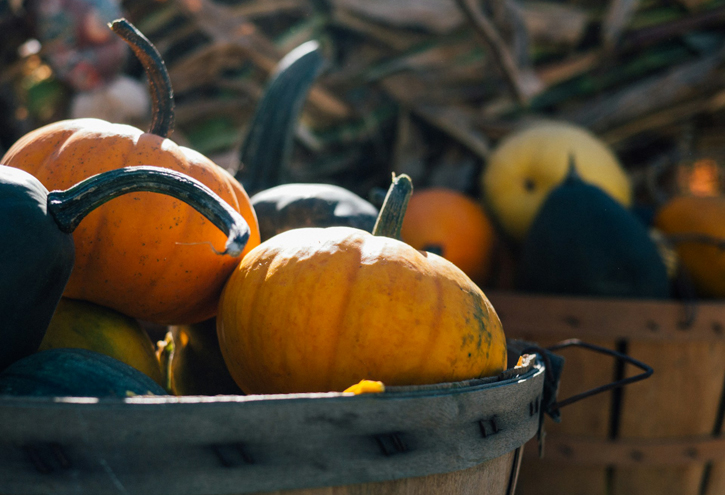It’s that time of year when artfully crafted Jack O’Lanterns perch on porches, pumpkin lovers flee to Starbucks, and aromas of pumpkin spice infuse the air. It’s very clear who the star of the show is this season. If you’re a lover of all things pumpkin, then you probably get giddy just by hearing the words: pumpkin and spice. If you don’t engage in the pumpkin hype, keep reading as I’m about to give you ten healthy reasons to fall in love with pumpkin.
I’m going to just throw this out there — pumpkin is truly a superfood! While there isn’t a “true” definition of superfood, the term signifies foods that are power-packed with nutrients that will do incredibly magical things to our bodies when we eat them. Based on pumpkin’s nutritional profile, it can definitely hold a light to goji berries, acai, and kale. For example, pumpkin’s pretty orange hue does more than make us think of Halloween. That orange hue comes from phytonutrients. Phyto means “plant,” and phytonutrients are healing nutrients specific to only plant-based foods. There are over 25,000 phytonutrients and pumpkin holds several of them in just one little (or huge!) gourd.
Now here are 10 healthy reasons you’ll fall in love with pumpkin.
1. Promotes Healthy Skin
Have you heard of a pumpkin facial? There’s a reason estheticians are using this superfood topically. Pumpkin pulp is high in collagen-building nutrients vitamin C and vitamin A. Vitamin A in pumpkin is in the form of carotenoids, some of which are converted to vitamin A in our body. There are over 600 different carotenoids. Pumpkin contains high amounts of the carotenoids zeaxanthin, lutein, and beta carotene. Pumpkin pulp and seeds also contain vitamin E, another vitamin that protects the skin. Vitamin E, vitamin C and carotenoids naturally protect the skin from harmful ultraviolet rays from the inside out. (However, still use your sunscreen!)
2. Supports Eye Health
Lutein and zeaxanthin, two carotenoids found in pumpkin, are also the main compounds found in the retina of the eye. Consuming foods high in lutein and zeaxanthin have been linked to lowering the risk of cataracts and age-related macular degeneration (the leading cause of severe, permanent vision loss in older adults).
3. Supports Immunity
There are several nutrients in both the pumpkin pulp and the seeds that can support the immune system and fight infection including carotenoids and vitamin C in the pulp and zinc and selenium in the seeds. Vitamin A has also been shown to increase white blood cells and T-cell production, immune cells that are critical to fighting infection. Just one cup of pumpkin pulp is equal to 245 percent of your daily recommended dose of Vitamin A.
4. Reduces Risk of Cardiovascular Disease
Cardiovascular disease is the leading cause of death in America and diet plays an important role in heart health. Pumpkin is especially beneficial for our hearts with its abundance of potassium, vitamin C, and vitamin E. Potassium helps to reduce blood pressure and vitamins C and E are potent antioxidants shown to reduce inflammation associated with heart disease.
5. Prevents Constipation
Not-so-fun fact: Less than five percent of Americans get the recommended amount of fiber each day (25-38 grams minimum is recommended per day for women and men, respectively). In fact, most people get less than 12 grams of fiber each day. Can you guess where fiber is found in plentiful amounts? If you guessed plant-based foods, then you’re already a plant-powered rock star! In fact, one cup of canned pumpkin purée contains 7 grams of fiber—that’s nearly 30 percent of your needs in just one food. Fiber is key for healthy digestion, but plays an important part in So.Much.More. It fosters a healthy gut, decreases inflammation, balances hormones, supports the immune system, prevents breast and colon cancer, and reduces cholesterol. That’s just the fiber-licious short list. Bottom line—fiber is pretty important.
6. Helps with Weight Management
Pumpkin pulp is also 94 percent water. Since pumpkin is high in water and in fiber it can help to fill you up quickly and keep you feeling full longer—factors that can support healthy weight. Not to mention, it’s also a good source of prebiotic fiber, which can foster healthy gut bacteria that support metabolism. Prebiotic fiber has been shown to increase the balance of bacteria that prevents obesity and co-morbidities associated with obesity. Changes in the gut microbiota after consumption of prebiotic fiber have been shown to positively affect energy intake, satiety hormones, and insulin sensitivity.
7. Decreases Risk of Cancer
Pumpkin seeds are high in lignans, which are phytonutrients that have been associated with decreased risk of breast, prostate and colon cancer. What’s more, the high antioxidant content of pumpkin seeds can reduce oxidation associated with inflammation and cancer initiation and progression.
8. Promotes Good Sleep
Pumpkin seeds are a natural source of tryptophan, an amino acid that converts to serotonin then to melatonin, the hormone that regulates the sleep cycle. The zinc in these powerful seeds assists with tryptophan’s conversion to serotonin. Pumpkin seeds are also an excellent source of magnesium, which has been shown to promote better sleep.
9. Boosts Mood
Eating seeds—particularly pumpkin (as well as sesame and sunflower seeds)–can boost serotonin levels through their high levels of tryptophan. One study gave subjects, who suffered from social anxiety disorder, a serving of pumpkin seeds to add to their diet daily and noticed less anxiety after just two weeks of eating the seeds. The magnesium in pumpkin seeds can help mood in two ways: It can block the activity of stimulating neurotransmitters as well as bind to calming receptors, resulting in a more peaceful, resting state.
10. Supports Healthy Bones
Nutrient-dense pumpkin seeds contain bone-building minerals like phosphorus, magnesium, and calcium. They’re also chock-full of healthy fats and plant-based protein—more nutrients that are essential for bone health.
For more information including some yummy pumpkin recipes, please check out the full post at Purely Planted.

Nichole Dandrea-Russert, MS, RDN, has been a registered dietitian nutritionist for more than 25 years, specializing in heart disease, diabetes, sports nutrition and women’s health. For more than a decade, she has focused on plant-based lifestyles through inspiring and educating people about plant-based eating to optimize their health and the health of the planet. Nichole has been featured in Eating Well, Business Insider and Atlanta Journal Constitution. She is also a media spokesperson for The Weather Channel and local Atlanta television networks. A former triathlete and current yoga instructor, she shares her passion through her website Purely Planted. Nichole is the author of The Fiber Effect and The Vegan Athlete’s Nutrition Handbook. She lives in Atlanta, GA with her husband.





